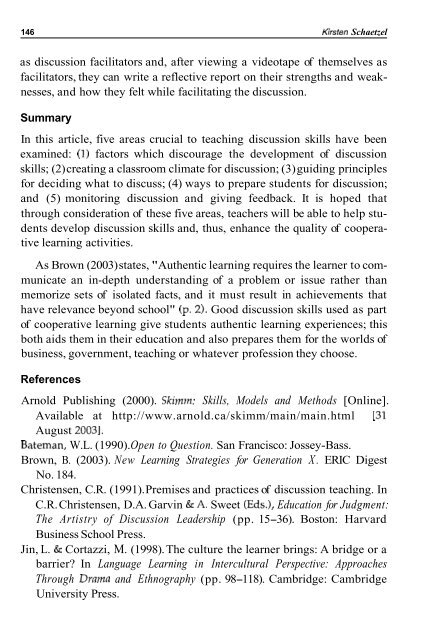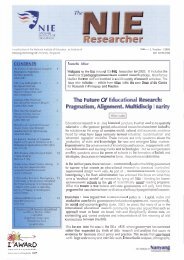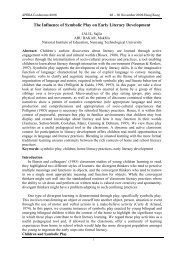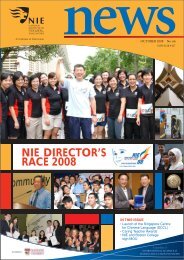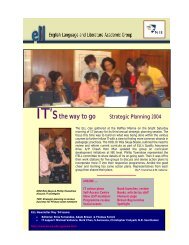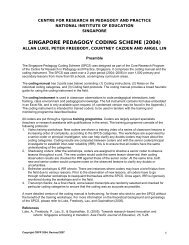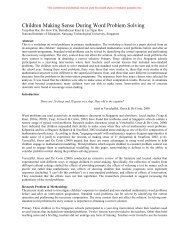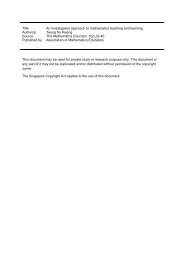Cooperative Learning - NIE Digital Repository - National Institute of ...
Cooperative Learning - NIE Digital Repository - National Institute of ...
Cooperative Learning - NIE Digital Repository - National Institute of ...
You also want an ePaper? Increase the reach of your titles
YUMPU automatically turns print PDFs into web optimized ePapers that Google loves.
146 Kirsten Schaetzelas discussion facilitators and, after viewing a videotape <strong>of</strong> themselves asfacilitators, they can write a reflective report on their strengths and weaknesses,and how they felt while facilitating the discussion.SummaryIn this article, five areas crucial to teaching discussion skills have beenexamined: (1) factors which discourage the development <strong>of</strong> discussionskills; (2) creating a classroom climate for discussion; (3) guiding principlesfor deciding what to discuss; (4) ways to prepare students for discussion;and (5) monitoring discussion and giving feedback. It is hoped thatthrough consideration <strong>of</strong> these five areas, teachers will be able to help studentsdevelop discussion skills and, thus, enhance the quality <strong>of</strong> cooperativelearning activities.As Brown (2003) states, "Authentic learning requires the learner to communicatean in-depth understanding <strong>of</strong> a problem or issue rather thanmemorize sets <strong>of</strong> isolated facts, and it must result in achievements thathave relevance beyond school" (p. 2). Good discussion skills used as part<strong>of</strong> cooperative learning give students authentic learning experiences; thisboth aids them in their education and also prepares them for the worlds <strong>of</strong>business, government, teaching or whatever pr<strong>of</strong>ession they choose.ReferencesArnold Publishing (2000). Skimm: Skills, Models and Methods [Online].Available at http://www.arnold.ca/skimm/main/main.html [31August 20031.Bateman, W.L. (1990). Open to Question. San Francisco: Jossey-Bass.Brown, B. (2003). New <strong>Learning</strong> Strategies for Generation X. ERIC DigestNo. 184.Christensen, C.R. (1991). Premises and practices <strong>of</strong> discussion teaching. InC.R. Christensen, D.A. Garvin &A. Sweet (Eds.), Education for Judgment:The Artistry <strong>of</strong> Discussion Leadership (pp. 15-36). Boston: HarvardBusiness School Press.Jin, L. & Cortazzi, M. (1998). The culture the learner brings: A bridge or abarrier? In Language <strong>Learning</strong> in Intercultural Perspective: ApproachesThrough Drnma and Ethnography (pp. 98-118). Cambridge: CambridgeUniversity Press.


